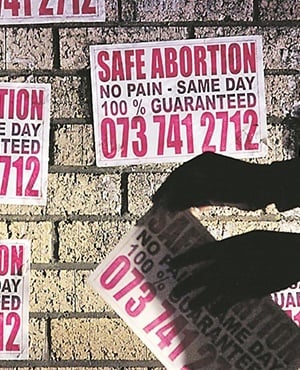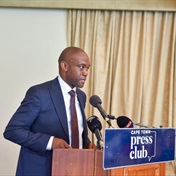
"I am collecting abortion stories."
This is how I start every conversation where women, including strangers, are assembled.
At first, to my surprise (and increasingly not), one woman, sometimes more, will admit to having had one.
And then we will, with throats clenched with emotion, share the stories of our abortions.
Then two other things we hold in common will emerge: that we’ve kept this a secret from most people all our lives (certainly never telling our parents) and that, despite the shame, personal and imposed, it is a decision we don’t regret.
More women than I’d imagined agreed to contribute their story.
About one in two will see it through, and the other half opt out at some point.
All have had legal abortions and all will ask for anonymity.
Whether they submit their writings or not, I get a sense from all of the women I interact with that they feel a sense of catharsis, an airing out of the soul.
It might be because, as one writer aptly put it: “We don’t talk about it [abortion] because we don’t talk about it because we don’t talk about it.”
There is a silence there, yet we all understand that abortion is a common social practice.
Tomorrow, October 31, is exactly 20 years since the National Assembly passed the Choice of Termination of Pregnancy Act, which is regarded as one of the most liberal abortion laws in history.
However, as with many progressive policies that came with the new dispensation, there seems to be laxness in implementing and ensuring this right.
Statistics show that more than half of all abortions are illegal, and one study by the World Health Organisation (2008) showed that at least 30% of respondents believed it was illegal to have an abortion.
If you consider that we walk past more backstreet abortion posters than marketing for the services by the state, the statistics make some sense.
I’m collecting abortion stories for the reasons above, but for others too, including to challenge the collective idea that abortions are the pastime of township teens.
Have you noticed how news reports on abortions tend to be accompanied by the stock picture of the shameful pregnant girl in the “gym dress”, as those of us who spent time in a township school call the tunic?
I am asking women for their abortion experiences because I believe that my and other women’s muteness is complacency.
It’s a subtle sanctioning of the illegal actions of state institutions that should uphold the rights of women that they can negate and abuse their duties.
And because I think women’s stories must cease to be portrayed in sharp moral rights and wrongs – good girls versus bad girls – especially because it tends to pathologise young black girls and their experiences.
And to just acknowledge the simple, cold fact that the decision and act to terminate a pregnancy can be one of the loneliest experiences of a woman’s life, no matter your race or standing in society.
The face of abortion is as diverse as our demographics – I’ve heard abortion reflections from black, coloured and white women.
Many choices to abort are made by the pregnant woman alone, others are collective decisions by couples, as in the case of a friend of mine and her boyfriend.
It’s true that many abortion decisions are made by frightened, poor teenage girls, but others are made by frightened middle class white and older women. Christians, traditionalists and nonbelievers alike terminate pregnancies.
It’s been so since the beginning, before it was a decision a woman could make independently.
In her research paper, The Culture of Illegal Abortion in South Africa, which was published in February, medical historian at University of Cape Town Rebecca Hodes says the country’s historical “archive is replete with cases of criminal abortion”.
“British settlers relied on pills and potions … Malays were said to favour red geraniums, while Khoi herbalists relied on a type of thornbush and Zulu women took a peppery shrub termed uhlunguhlungu.”
Under apartheid, “women from diverse population groups practised illegal abortion en masse”, she writes.
The state did not care, except in the case of whites – its focus was on preserving the purity of white women, who were severely punished and publicly shamed for violating this sexual control.
So white women went further underground and procured their abortions in the UK or Holland.
“From the 1970s, a stream of health tourists flowed to other countries,” writes Hodes. “In London, the number of patients warranted the creation of a private service catering to South Africans seeking safe, discreet, legal abortions.”
This was a solution for the wealthy few. The majority at home took the unsafe route, as many still do today, despite the health risks.
The laws might have progressed on women’s sexual and reproductive rights, but we seem to have stood firm on the secrecy and stigma. Again, it is at the expense of poor women, as Wits law expert Cathi Albertyn points out in Claiming and defending abortion rights in South Africa (2015).
These women are the ones facing a “declining health system, pervasive stigma and normative resistance, a less visible nongovernmental sector and unclear political will”.
An abortion activist knows of patients in the Eastern Cape who are turned away so many times at public clinics that they pass their first trimester, and then have no choice but to seek illegal solutions.
This is not unlike during apartheid, when the vast majority of illegal abortion cases were ignored by the state, “their health consequences managed by a phalanx of formal and informal healthcare workers and borne largely by black women”, writes Hodes.
So we need to talk about our abortions, especially those of us who were privileged enough to procure them in private and with discretion.
It’s important because black girls need to know that older, white and middle class women have abortions, too. Lawyers, teachers, writers, nurses and architects … That loving couples choose termination.
They need to know that the mistakes they make are not unique to them because they are black and poor, but are actually shared across the colour and economic spectrum with women with much greater socioeconomic capital.
This is why I’m asking every woman who feels they can contribute to write. I’d like to see the topic freed from society’s moral grip so we can stop subjecting women to old mistakes, and move to conversations and solutions that will take us forward.
If you want to share your story with me, email me for a brief at joonjilanga@gmail.com. Stories that are accepted will be published. Anonymity is guaranteed for contributors.
Follow me on Twitter @joonji
TALK TO US
Have you had an illegal abortion? Did you know that abortions are legal in SA?
SMS us on 35697 using the keyword TALK. Please include your name and province. SMSes cost R1.50




 Publications
Publications
 Partners
Partners























